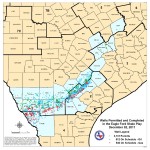What Texas Can Do About Roads Damaged By Drilling

Photo by Spencer Platt/Getty Images
Trucks with the natural gas industry drive through the countryside earlier this year in Springville, Pennsylvania.
With the good can also come the bad, and that’s certainly been the case with the drilling boom going on in various parts of Texas these days. As drillers use thousands of trucks — hauling millions of gallons of water and other supplies to rigs — roads inevitably suffer. Naturally, people are questioning who is going to be responsible for repairing them.
Phil Wilson, executive director of the Texas Department of Transportation (TxDOT), talked to the Texas Tribune about the issue. He says that to drill a well, it takes some 1,200 trucks. And then it takes another 300 trucks each year just to maintain it. The impact of all those trucks is equivalent of 8 million cars annually.
And those roads — built in the fifties and sixties — weren’t constructed for heavy use, Wilson tells the Tribune. “They were built as farm-to-market roads for country trucks and for agriculture,” he says. “They weren’t built for 18-wheelers … so a road was built for 25 years and you get that level of traffic, it can diminish it down to six or seven years.” Damage from drilling trucks in the Eagle Ford Shale of South Texas alone was recently estimated at $2 billion by TxDOT.
Some possible solutions? Wilson says the agency is looking at ways to do more about the issue:
“If I spend a dollar today on what I call armoring the road, where I make it wider or I make the concrete pavement thicker, then I have to spend less in the future and so my maintenance costs are a lot less. If you let it get to the point where it’s harmed or it gets stresses and cracks and gets real damage and stresses, it costs you a lot more money. We’re trying to work with our partners in industry to talk about how much it costs. And they need it, too. … They need to have a good system as well. There’s an economic and safety component for their guys and process as well. So we’re really trying to be thoughtful about the cost and how you do it and be proactive as opposed to reactive.”
One issue some counties are facing is that even with increased revenues from drilling, it isn’t enough money to repair the roads.
Take DeWitt County in the Eagle Ford Shale. According to a recent report released by County Judge Daryl Fowler, the county received $7.2 million in property taxes for the fiscal year ending in September, but will need as much as $342 million to replace or repair nearly 400 miles of roads.
“Right now, taxes and donations are the only two viable options available to fix county roads, which may require up to $80,000 per mile to repair and up to $1,900,000 per mile to rebuild,” Fowler said in a statement accompanying the report. “Austin may be waiting for a rainy day, but you could describe our situation as similar to being in the middle of a monsoon; and it’s high time to do something about it.”
You can read the interview with Phil Wilson of TxDOT in full over at the Texas Tribune.


